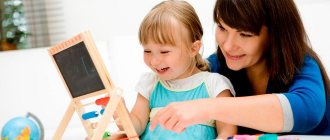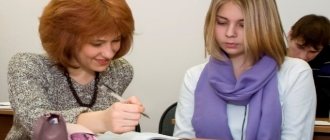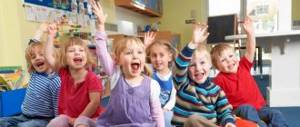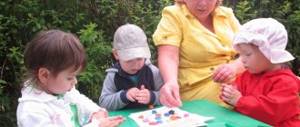What a child should know and be able to do before entering school
Preparing children for school takes a lot of time, so some parents prefer to send their children to private schools. Such institutions recruit groups of preschool children to learn everything they need under the guidance of professional teachers. At the same time, families should also regularly work with children, because in any case an individual approach is important. In order for a child to adapt to school subjects without great difficulty, he must:
- know letters;
- be able to read (possibly syllable by syllable) small simple texts;
- have writing skills;
- know the seasons, names of months, days;
- know your last name, first name, patronymic;
- have a good memory to remember 5-7 out of 10 clearly named simple words;
- find similarities and differences between objects;
- be able to subtract and add numbers within the first ten;
- know basic geometric shapes;
- know 10-12 primary colors, etc.
Methods for preparing children for school
Before giving any tasks to prepare your child for school, familiarize yourself with several popular methods. With their help, a child can acquire all the necessary skills during training. Teaching methods are usually aimed at developing fine motor skills, logical thinking, obtaining mathematical knowledge, etc. At the same time, taking into account the individual characteristics of the preschooler, it is necessary to engage in his physical training. Known methods of primary education:
- Zaitseva;
- Montessori;
- Nikitins.
Zaitsev's technique
To ensure that your child’s preschool preparation at home is successful, pay attention to Zaitsev’s methodology, which includes an approach to teaching reading, writing, English and Russian. It involves the use of visual perception of information. The main principle is to teach the child everything necessary without harm to health and taking into account individual characteristics. It is able to activate the channels of information perception, saving time and saving the child from cramming. Minus: with individual lessons, the methodology is implemented worse than with group lessons.
Montessori method
An individual school preparation program that helps prepare a future first-grader can be organized in accordance with the Montessori method. It pays great attention to the development of sensations and fine motor skills of the baby. It is not necessary to use any special aids during the learning process. Parents must create a complete developmental environment for their child. The disadvantage is the absence of role-playing and outdoor games in the methodology.
Nikitin's technique
To increase your level of knowledge with homework, check out the Nikitins’ method. Its main principles are development, which must be creative and free. Classes are held alternating: intellectual, creative, sports. The sports atmosphere plays a fundamental role in the formation of a child, so all conditions for this should be created in your home. The methodology is creative, with an emphasis on physical development and creativity, but there is a minus - not all children have a desire to learn.
People around you can influence school readiness
Remembering how terrible it was to go to school, adults can frighten children with difficulties.
This should under no circumstances be done.
This is how the human psyche works. If a preschooler does not yet know what school is, and they tell him how bad it is to study, he will be scared.
Further, even in the process of schooling, he will see mainly the bad in her.
What do you need to pay attention to in order for a child to want to go to school?
In preschool and primary school age, a child, as a rule, is most actively interested in the world around him. He wants to know literally everything about everything, and be able to do just as much.
Tell him that at school they will tell him everything and teach him everything.
In addition, mention that you can find new friends there, they don’t force you to sleep during the day and they feed you delicious food, and after classes you can go for a walk (the latter is not necessary).
Preparatory classes for school
You need to start working with your baby from an early age. Particular attention must be paid to psychological preparation. At first, tasks are completed in a playful way, but then they become more complex but interesting. Children usually receive basic knowledge in kindergartens. You can achieve great results either at home by inviting a private tutor, or by sending your child to special development centers or preparatory courses at schools.
School preparation courses
When you decide to choose preparatory courses for school, be careful when choosing a suitable institution. Such courses are available both at the schools themselves and in educational centers, i.e. non-profit organizations. With the help of comprehensive classes and a team, children can adapt to the school system and lessons. Often, in such courses, preschoolers are taught so that they can easily complete the necessary exercises and answer certain questions correctly. It is much more important that the baby be able to think creatively, reason independently and draw conclusions.
Preschool tutor
A tutor for a preschooler is an excellent option to teach your child to read and write and prepare him for future interviews at school. Moreover, some teachers additionally teach children English. Do not forget that a tutor to prepare a child for school must have a pedagogical education and appropriate qualifications. The big advantage of tutoring is the individual approach, which will help develop attention, reasoning skills, etc. The child will gain deeper knowledge. Cons: difficult to find a decent teacher, high cost.
Preparation for school. Lesson No. 1: “Properties of objects. Sounds and words" (34 lessons in total).
What you need to know about school readiness
There are several types of school readiness
- physiological
- psychological
- social
Each of them should be worked on separately.
What do you think these types of preparedness include?
“The sooner the better” does not work in this case
If you think that a six-year-old child is already capable of being ready for first grade on a par with seven-year-olds, then think again!
A child's body at six and seven years old has different physiological and mental characteristics.
They determine the possibility or impossibility of normal schooling, regardless of intellectual abilities.
If you hurry, you can bring your child to a nervous breakdown with studying.
This also applies to classes with preschoolers aimed at developing the knowledge, skills and abilities that should be developed in school:
- arbitrariness of attention
- memory and behavior
- mathematical abilities (for example, supposedly useful mental arithmetic, popular today) and so on
Remember that if a child masters the school curriculum before school, then he will no longer be interested in the lessons.
In addition, the main activity of preschoolers is play. Therefore, we should not forget about the intrinsic value of childhood. It’s better for your child to play enough before school so that his childhood is full and he doesn’t have to “finish playing” later (for example, take toys to lessons).
How much does it cost to prepare a child for school?
Preparatory courses will increase your child’s readiness for admission, especially if you plan to send him to a gymnasium. It is recommended to prepare in this way for those children who do not attend kindergarten. Classes in specialized institutions are aimed at mastering the basics of writing and literacy, learning to read, developing speech and musical skills, etc. Some centers teach chess, foreign languages, etc. Cost of training in Moscow:
| Center name | Cost in rubles |
| "A LITTLE PRINCE" | 600 for 1 lesson |
| "RAY" | from 7600/month 2 times/week |
| "CONSTELLATION" | From 28,000/month for children 4-6 years old, 5 times/week |
| "PRESIDENT'S SCHOOL" | Comprehensive training 11000 for 4 lessons of 90 minutes |
With whom and where to study?
At the kids' club? Privately with a teacher? In preparatory groups at school?
It's not about the premises, but about the specialists who will do their job in any institution.
The “advantages” of group classes at school are the opportunity to see the school and its everyday life, so to speak, from the inside, the opportunity to meet the future teacher, and for the child to get used to the environment. This is especially important for the overwhelming majority of children at home who did not attend kindergarten.
The desire of many parents to have their child deal with individually is not always justified.
Indeed, during an individual lesson, all the teacher’s attention is directed to one child. But at the same time, the child is tense, as he must be in a state of constant attention, and this is very difficult.
Based on many years of practice, I see that classes in a small group (4-5 people) are much more productive. With so many children, my attention is enough for everyone, I see everyone and can help everyone in time. On the other hand, my attention is distributed evenly, and the children feel less stressed, learn to cooperate, hear each other, which is also one of the components of readiness for school.
If possible and necessary, you can combine group classes with individual classes.
Free training
Kindergarten teachers must lay the foundations of counting, writing and reading. Parents are faced with a more important task - to teach their kids to finish what they start, let it be some examples from mathematics, a drawing lesson, or something else. To ensure that your child’s level of development corresponds to his age, try to communicate with him more, answering all questions. Pay attention to active games, physical development, teach independence and safety rules.
Social readiness for schooling
What is it?
First of all, the level of so-called social intelligence (the ability to interact with adults and peers) and the level of social responsibility (knowing one’s address, full name, parents’ names, as well as knowledge of safety rules, etc.). Let us repeat that visiting kindergarten helps us in this regard.
If you did not attend kindergarten, then you can try to compensate for this by the child communicating with peers in the yard, in a yard club, in a circle, and so on.
A future first-grader can be taught how to communicate with adults in the process of meeting, for example, his friends, adult relatives, a pediatrician, a hobby/yard club teacher, and others. A child’s knowledge of information about himself, his family and safety rules (traffic, communication with strangers, and so on) depends on how well his voluntary long-term memory is developed, as well as on his level of discipline (arbitrariness of behavior) and trusting relationships with parents.
How to prepare your child for school yourself
To develop memory, the ability to think logically and other skills at home, read or watch cartoons together, discussing what the child has learned. Inquire about your child’s opinion more often by asking questions. Try to make home activities fun for your preschooler. The advantage of preparing a home is that it saves money, and the necessary materials can always be found on the Internet. The downside may be the quality, because not all parents have a pedagogical education. In addition, family activities do not always discipline the child.
Where to start preparing
According to psychologists, the most suitable age for a future first-grader to begin education is considered to be 3-4 years. Start teaching your child to read and count in a playful manner, for example, while walking, count the number of houses, cars, etc. with him. Do crafts together, paying attention to the artistic development of the future first-grader: draw, create applications, sculpt, assemble puzzles. Set up a comfortable desk at home. Pay attention to your child's motivation, otherwise learning will progress slowly.
Program
You should not prepare your child for school in the abstract; try to find requirements, tests, assignments and specific examples of questions. To develop fine motor skills, a child must string pasta or beads, cut something out of paper, paint, create appliques, embroider, knit, etc. To teach your baby everything he needs, pay attention to the following lesson plan:
| Course name | Number of hours per week |
| Speech development, preparation for learning | 1 |
| Introduction to Mathematics | 1 |
| Development of motor skills and creative abilities | 1 |
| Getting to know the world around you | 1 |
| Introduction to Fiction | 1 |
| Preparing your hand for writing | 1 |
Materials
To teach your child everything he will need when entering school, use special visual materials. You can find them in large quantities on thematic web resources. To develop logical thinking, attention, memory and imagination, there are many educational games that require multi-colored cardboard. For example, to teach literacy you will need a picture book: choose any letter, say it several times and ask your child to trace it with a pencil all over the page. More details can be found in the manuals.
Games to prepare preschoolers for school
Educational games will help future preschoolers consolidate their knowledge of the alphabet, learn to form words, write and read. In addition, such activities help develop attention and concentration. Moreover, a preschool child is often distracted and cannot concentrate on one activity for a long time. Games that will help in the development of the baby:
- Title: "Book Detective".
- Goal: develop quick thinking, teach how to correlate letters with specific pictures.
- Material: book with illustrations.
- Description: give your child the task of finding a picture in a book that starts with a certain letter. If several children participate in the game, then introduce an element of competition, i.e. The winner will be the one who finds the most required pictures.
Here's another good option:
- Title: "Illustrator".
- Goal: to teach how to use a book, to develop logic and imagination.
- Material: several books.
- Description: read a short story or poem to your child, then invite him to select pictures from other books. Then ask them to retell a brief plot of what they read, based on the selected pictures.
Developmental activities
As developmental exercises, you can use any labyrinths where a character needs help getting to the exit or getting somewhere. There are many games that help improve concentration and increase its volume. Some exercises promote the development and voluntary attention. A good option for an educational game:
- Title: "Flowers in the Flowerbed"
- Goal: to develop logical thinking.
- Material: multi-colored cardboard.
- Description: cut out three flowers of blue, orange, red and three flower beds of rectangular, square, round shapes from cardboard. Let your child distribute the colors in the flower beds based on the story - red flowers did not grow in a square or round flower bed, orange flowers did not grow in a rectangular or round flower bed.
Another game that is great for developing a variety of skills in preschoolers:
- Title: “How are they similar and how are they different?”
- Goal: to develop logical thinking.
- Description: offer children two objects each, which they must compare and indicate their differences and similarities.
Methods of early development of the Nikitin family
The Nikitins are the authors of a comprehensive method of preparing for school, which allows for the comprehensive development of a child and ensures his readiness for further education.
- General principles of the Nikitin school preparation method:
The Nikitina spouses learned the method of raising children from their own pedagogical and family experience, as well as through observations of raising children in different families. They stated that parents tend to go to two extremes when taking care of their children at home - this is either over-organization or abandonment. In the first option, the child is constantly dragged to different clubs, a dozen tutors work with him, he simultaneously learns English, dances, swims and plays the piano. Of course, in this case, you can forget about a full-fledged childhood. Another situation is the opposite: the child is left to his own devices and grows “like grass by the road”, without additional activities and stimulation of development. Of course, it is obvious that both of these situations are harmful for the child.
The basic principles of the Nikitin school preparation methodology are expressed in the following postulates: development must be free and creative . Children study when they want and what they want, alternating intellectual and creative activities with compulsory sports.
The sports atmosphere in the Nikitins’ method plays a fundamental role: since the child is naturally physically active, parents must provide him with the necessary opportunities, following his desires and preferences. There should be sports equipment in your home, you should provide your child with the opportunity to attend a sports section of his choice, and, of course, you yourself should lead a sporty and healthy lifestyle.
In addition, parents should monitor the child’s development and gently and unobtrusively stimulate him . That is, do not force the child to learn the alphabet, but, as if by chance, buy him blocks with the alphabet, offer games for learning words, and so on. In the context of preparing for school, this means that parents should not make a cult out of going to school; they just need to ensure that by the time the child enters he has already mastered the necessary knowledge, skills and abilities in a form that is convenient and acceptable for him.
- Advantages of the Nikitin school preparation method:
The technique is free, with a great emphasis on creativity and physical development. According to the Nikitins’ method, there is a lot of information, books, many excellent educational intellectual games and manuals, which are not difficult to find and apply.
- Disadvantages of the Nikitin school preparation method:
The main disadvantage is that not all children are eager to study independently, even if all the necessary conditions have been created for this. The fundamental task of parents in this case is to ensure the child’s lasting interest in the activities being conducted. This can be achieved if you never create an atmosphere of forcing a child to study and never do for a child what he can do himself. But, alas, there are children who are still difficult to interest, and not all parents are able to make the child want to do something himself. This is especially true for physical development - for children with a phlegmatic temperament or poor health, for example, such active sports may not be suitable.
How to psychologically prepare a child for school
The personal and social readiness of a preschooler lies in the fact that by the time of admission he must be fully prepared both for communication and interaction with peers and adults. For psychological preparation to be truly successful, provide the child with the opportunity to independently establish contacts with others on the playground.
So-called “children at home” are often afraid of large crowds of people, although not all adults feel comfortable in a crowd. At the same time, we should not forget that the future first-grader will have to be in a group, so try to get out to public events from time to time. Motivate your child - if he is used to constant praise at home, then evaluate not every step, but the finished result.
To teach or not?
Have you noticed that when I talk about readiness for school, I’m not talking about teaching a preschooler, for example, to read? Does this need to be taught?
There can be no clear answer to this question.
I am far from saying that children should not be taught to read before school. It’s not bad if a child can read before school. The only important thing is at what cost this skill was given to him. Was it the desire of the child himself or the desire of the parents “not to lose face”?
A typical mistake of parents is that they begin teaching their child to read (or other elements of the school curriculum) by their own volitional decision, without taking into account the level of his development.
When an inquisitive, active child with developed thinking and speech is drawn to learning to read or is very interested in numbers and counting, then, of course, it is necessary to support his interest and help him learn. Training in this case will be quite appropriate.
But if parents take on this work, then they must have certain knowledge of teaching methods and must be sure that the child will develop the correct skill. If you are not so sure, it is better to turn to specialists.
It happens that the child is not mature, not ready and, accordingly, does not strive for these school skills. In this case, artificial learning will be violence.







